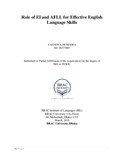Role of EI and AFLL for effective English language skills

View/Open
Date
2018-03Publisher
BRAC UniversityAuthor
Humaira, TasnovaMetadata
Show full item recordAbstract
Keeping pace with changing world, English language teaching has also adapted itself to cater the needs of different individuals. Now, every stakeholder of the English language teaching and learning aims to individualize the process of learning for effective language achievement. In fact, different variables have been identified to enhance the process of learning and teaching English, among them two of the most important variables have emerged- Emotional Intelligence (EI) and Attitude towards Foreign Language Learning (AFLL). There are different theories and scales available for both EI and AFLL that are directly and indirectly associated with language teaching. Keeping all the theories in mind a research was conducted to find the role of EI and AFLL for effective English language skills among undergrad students of tertiary education. The research used both students and teachers as the participants for a mixed research where both quantitative and qualitative data were collected. After the data collection was complete the data were analyzed thoroughly, and it was determined that- EI and AFLL both have a strong positive correlation with the effectiveness of English language skills. It was also found out that there is a strong positive correlation between EI and AFLL. All these data have the potential to improve English language teaching.
Keywords
Emotional Intelligence; Attitude to Foreign Language Learning; ELT; EFL; ESL; Language skillsDescription
This thesis report is submitted in partial fulfilment of the requirements for the degree of Masters of Arts in Teaching to Speakers of Other Languages, 2018.Department
BRAC Institutes of LanguagesType
ThesisCollections
- Thesis (M.A in TESOL) [113]
